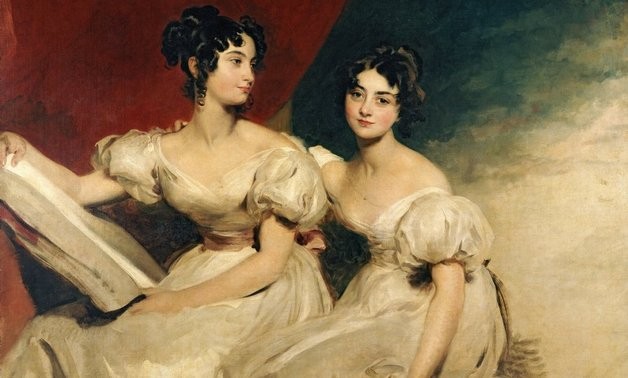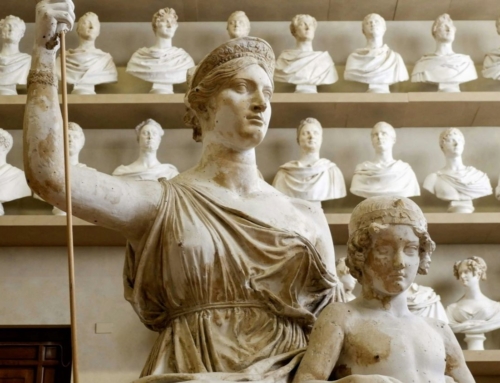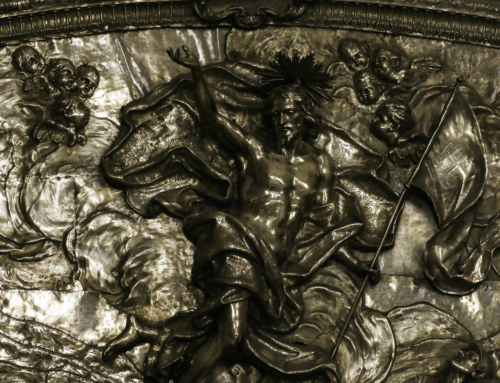The fourth in a series considering Jane Austen in light of Aristotle and Thomas Aquinas.
For all whom we love and value, for every friend and connection, we equally pray; however divided and far asunder, we know that we are alike before Thee and under Thine eye. May we be equally united in Thy faith and fear, in fervent devotion towards Thee, and in Thy merciful protection this night.
—from Jane Austen’s Prayers
“Happiness in marriage is entirely a matter of chance. If the dispositions of the parties are ever so well known to each other or ever so similar beforehand, it does not advance their felicity in the least. They always continue to grow sufficiently unlike afterwards to have their share of vexation; and it is better to know as little as possible of the defects of the person with whom you are to pass your life.”
Such are the thoughts of Charlotte Lucas concerning the nature of the relationship enjoyed by husband and wife. In her mind, the happiness that accompanies true friendship is not a necessity for a good marriage but is, rather, a blessing that is a bonus in cases of good fortune. Given her outlook, there is no surprise that Charlotte agrees to marry a man for whom she has little or no esteem. In so doing, she provides a sharp contrast with her friend, Elizabeth, who—though not a complete romantic in her own notions of matrimony—has a higher estimation of the relationship that ought to be shared by spouses.
Throughout each of Austen’s novels, friendship plays a prominent role. Catherine Morland learns the distinction between true and false friends by comparing the fickleness of Isabella Thorpe to the constancy of Elinor Tilney. Isabella seeks Catherine’s friendship only for the sake of furthering her own prospects, whereas Elinor continually shows an earnest interest in Catherine and seeks to comfort her in her trials. In Emma, Mr. Knightley expresses great concern over the heroine’s lack of a proper friend from whom she can derive true benefit. Even among Austen’s men, in Persuasion, Captain Wentworth receives support from his friend, Captain Harville, in weathering the storm of his passions and his reason after Anne breaks off their first engagement.
While he does not delve much into spousal relationships, Aristotle does consider friendship to be one of the chief fruits and aids to the virtuous life. Aristotle identifies three kinds of friendship which, though distinct, are not necessarily exclusive. First, there is the friendship of utility, which is based upon the usefulness each party derives from the other. A second kind of friendship is that which is based upon pleasure, which lasts only as long as one derives enjoyment from the other. Finally, there is true and perfect friendship, which is sought for the sake of the other. This last friendship proves to be the most lasting because it is based upon goodness of character, which has an enduring quality, whereas the other two kinds pass away once utility and pleasure can no longer be derived from the match.
Reflecting on the nature of virtuous friendship, Aristotle notes that true friendship does not readily exist where there is great inequality. Primarily, this observation applies to the varying levels of virtue in people. Where there is a perceived lack of virtue and understanding, there will be a lack of respect, thus precluding any possibility of a mutual appreciation of the other for her sake. This mutual relationship, built on an appreciation for the other, implies that the true friend will rejoice over the other’s happiness and mourn over her misfortunes. When he does briefly consider the relationship between a husband and wife, Aristotle notes that it can be founded upon any of the three kinds of friendship but that the best marriage will be the one rooted in true friendship.
In Pride and Prejudice, all three types of friendship are on display. Of the two imperfect kinds of friendship, the marriages of Lydia and Charlotte provide good illustrations. The marriage between Lydia and Mr. Wickham proves to have no other foundation than that of the pleasure one can gain from the other, and, as it turns out, there is no intention on the man’s side to fully pursue the marriage until he receives financial incentives to do so. In the case of Charlotte, she is well aware of her position in society and that her future economic security depends greatly upon her marriage, but she is also aware of the silliness and shallowness of Mr. Collins and the little hope she has of ever esteeming him. Nevertheless, she not only welcomes his overtures, but even seeks them. In these marriages, there is no proper foundation of mutual care and respect for the other. Mr. and Mrs. Bennet provide a prime illustration of the risk that such couples run if they do not base their marriage upon a solid relationship. Mr. Bennet has found that he cannot esteem his wife, while Mrs. Bennet does not care for that esteem and respect. As a result, their household crumbles beneath them, to which Lydia’s unrestrained, unprincipled behavior testifies.
Determined not to follow in the footsteps of her parents, Elizabeth approaches the question of marriage with a steady reasonableness, avoiding the potential advances of Mr. Wickham even before she fully knew his character due to the imprudent nature of a match with little money on either side and hints of inconstancy on his side already beginning to show. The reader is also assured of her own resolve not to marry for mercenary motives either, as she scorns her sister Jane’s attempts to defend Charlotte’s marriage. On this occasion, Elizabeth emphatically asserts that “[y]ou shall not for the sake of one individual, change the meaning of principle and integrity, nor endeavour to persuade yourself or me, that selfishness is prudence, and insensibility of danger security for happiness.” And while she eventually learns to think of Charlotte’s decision in a less critical light, she still recognizes that the level of mutual trust and friendship could never be the same between Charlotte and herself, due to such a fundamental difference in principles.
Of course, Elizabeth does find the man she can love and respect in Mr. Darcy. Though one might suspect she harbors a trace of the mercenary motive given that her affection began once she had been to Pemberly, the narrator provides enough insight into her thoughts to assure the reader that Elizabeth’s affection is founded upon her growing respect for Mr. Darcy’s taste and true, generous character. Likewise, while Darcy’s love may have initially begun as a sort of infatuation with her unorthodox beauty and playful character, he grows to truly appreciate and esteem her character.
Ultimately, Austen proposes a model for relationships that may appear rather unsatisfactory to a modern reader’s notion of romance. Elizabeth’s attraction to Mr. Darcy may very well be described as rational, founded first of all upon an appreciation for his taste and judgment rather than an attraction to his appearance or behavior. Nevertheless, with such a foundation, Austen assures the reader that Elizabeth and Darcy will have an enduring marriage. Confident in her expectations of happiness, Elizabeth compares her felicity to Jane, who “only smiles,” whereas she laughs.
✠
Image: Sir Thomas Lawrence, A Double Portrait of the Fullerton Sisters







